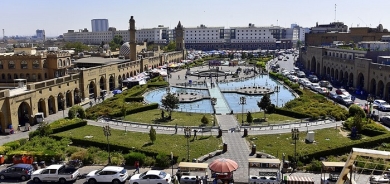Arab League says China, Russia may be shifting on Syria; EU prepares fresh sanctions

“There are indications coming from China and to some extent from Russia that there may be a change in position,” League Secretary-General Nabil al-Araby told a news conference in Cairo.
China and Russia’s blocking this month of a draft U.N. Security Council resolution that backed an Arab plan demanding that Syrian President Bashar al-Assad step aside angered the West and Arab states.
They also voted against a non-binding General Assembly resolution to back the Arab plan last week.
China has sent envoys to the region, stung by Western criticism that by vetoing the resolutions it was allowing the violence in Syria to increase.
Al-Araby also said a meeting on Friday in Tunisia of the “Friends of Syria” -- a group that includes Arab and Western nations -- was to “put extra pressure on Syria.”
The President of the General Assembly Nasser Abdel Aziz said before the news conference in Cairo the international community could no longer remain silent on the situation in Syria.
“We know there are difficulties in the Security Council but I think we cannot stay silent and have to exert the utmost pressure so that the (Syrian) government implements what was agreed upon, or make the Security Council look into the matter more seriously because it is dangerous and there are big violations,” he said, according to Reuters.
“The international community cannot remain silent in such a dangerous case as Syria’s,” he added.
Syria-based activist Mustafa Osso told The Associated Press that Assad’s military should face strong resistance as residents plan to fight until “the last person.” He added that Homs is facing “savage shelling that does not differentiate between military or civilians targets.”
The Baba Amro neighborhood on Homs’ southwest edge has become the centerpiece of the city’s opposition. Hundreds of army defectors are thought to be taking shelter there, clashing with troops in hit-and-run attacks each day.
Amateur videos posted online showed what activists said were shells falling into Baba Amro. Black smoke billowed from residential areas. Phone lines and Internet connections have been cut with the city, making it difficult to get firsthand accounts from Homs residents, according to AP.
Calling for Assad to step down
Meanwhile, the European Union will likely adopt fresh sanctions against the government of President Assad in the coming week, German Foreign Minister Guido Westerwelle said on Monday.
Germany and other Western powers have repeatedly called on Assad to step down to put an end to protests against his government, which have triggered a violent backlash from his security forces.
Syrian security forces have killed more than 5,000 people in the past year, according to human rights groups, while the Assad government says more than 2,000 soldiers and security agents have been killed.
“We will adopt further sanctions in Europe, and not just in Europe,” Westerwelle told Reuters in an interview on the sidelines of a meeting of foreign ministers from the Group of 20 economic powers in Los Cabos, Mexico.
“I believe sanctions will be tightened in the next week, because the violence is continuing,” he said, when asked whether Europe would adopt measures to blacklist Syria’s central bank.
Westerwelle declined to name specific sanctions under consideration, but a G20 official at the meeting, speaking on condition of anonymity, said the EU was on course to agree to measures to curb the central bank’s ability to operate.
New round of sanctions
EU diplomats said this month they were working on a new round of sanctions against Syria, which they hope to finalize by Feb. 27. These would include a freeze on the Syrian central bank's assets as well as on most transactions with it.
Westerwelle said it was time to raise diplomatic pressure against Syria, and received support from the United States and Britain in Mexico, who also urged China and Russia to do more.
“We’ll send a clear message to Russia, China and others who are still unsure about how to handle the increasing violence, but are up until now unfortunately making the wrong choices,” U.S. Secretary of State Hillary Clinton told reporters.
On Monday, Beijing and Moscow showed support for Assad.
Assad met a senior Russian politician in Damascus, who reiterated Moscow’s backing for his self-styled reform program and spoke out against any foreign intervention in the conflict, Russian and Syrian news agencies reported.
China accused Western countries of stirring up civil war in Syria and two Iranian warships docked at a Syrian naval base, underscoring rising international tensions over the crisis.
Westerwelle said he expected a meeting in Tunisia organized by the Arab League later this week to strengthen the hand of the Syrian opposition, which is hoping for official recognition as a government-in-waiting.
Clinton said the Feb. 24 meeting in Tunisia of the “Friends of Syria,” organized by the Arab League to build international momentum against Assad, would help weaken Assad’s government.
“Like the U.N. general assembly resolution that passed overwhelmingly last week, the upcoming meeting will demonstrate that Assad’s regime is increasingly isolated and that the brave Syrian people need our support and solidarity,” she said.
“We have to prepare for the likelihood that the Syrian regime is going to be under increasing pressure which will create perhaps more space for all of us to push hard on a transition, and we will intensify our diplomatic outreach to those countries that are still supporting the Assad regime.”
Arab countries will encourage the Syrian opposition to unite before they formally recognize them as a government-in-waiting, Tunisia’s government said as it prepared to host the meeting.
The Syrian National Council (SNC) has emerged as the international voice of the uprising but has yet to show a real command over grassroots activists and an armed insurgency.
British Foreign Office minister responsible for relations with Latin America, Jeremy Browne, said Assad’s government no longer reflected the will of its people and urged dissenters in the U.N. Security Council to provide a solution to the problem.
“We’d like to see the Russians and Chinese come forward with more suggestions on how we can bring about peace in Syria,” he said. “The regime is existing on borrowed time.”
(Reuters)














